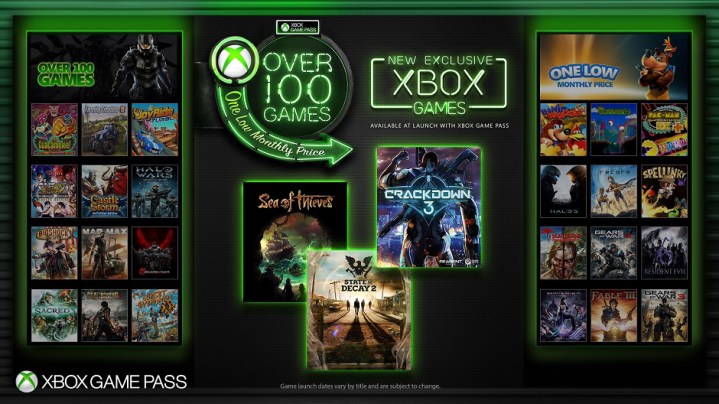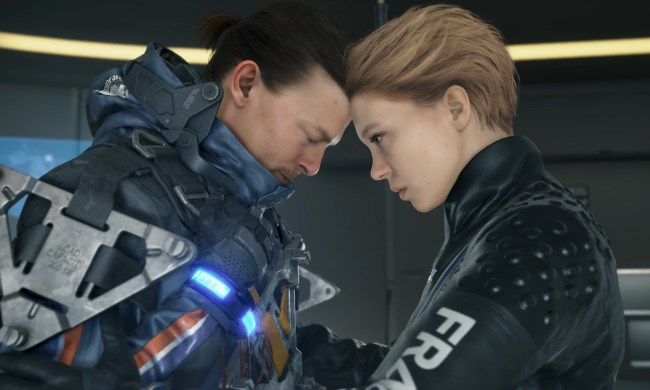
For $10 a month, subscribers can download and play more than 100 Xbox One games, including older Xbox exclusives like Halo 5: Guardians and Gears of War 4. The program was already an affordable way to bulk up your game library, but without access to new games, it meant you’d always be playing catch up. That is about to change: On Tuesday, Microsoft announced it will add its first-party games to Game Pass on launch day. Game Pass players won’t have to pay full-price or even half-price for Sea of Thieves or Crackdown 3, as well as a slew of older games. The change doesn’t just add value for those already enrolled in the program: It makes the case for purchasing an Xbox One.
Xbox Game Pass is now the best case yet for everyone to own an Xbox One
Since 2016, Microsoft has struggled to make a compelling case for owning an Xbox One. The Xbox Play Anywhere program, which allows players who own a first-party Microsoft game to play it on Windows 10 or Xbox One, sounds great in theory, but doesn’t incentivize buying a console. Even without it, Microsoft’s first-party games have made some compelling cases for the console, but the sheer number of PlayStation 4 exclusives dwarfs anything Microsoft could offer.
Game Pass has been around since mid-2017, but has never gained much traction. Between the relatively limited selection, and the lack of new, high-profile games it has never become the industry changing “Netflix of video games” that it could (and maybe should) be. By adding its best and brightest games, Microsoft may finally give Game Pass the tools it needs to succeed, and in doing so, could find a new way forward for the Xbox platform.
What if Xbox becomes the Netflix of video games?
Looking at services like Netflix and Spotify, we know the profound potential benefits of a game console with a meaningful subscription service for new content. Players will get access to titles across a wider array of genres, rather than the shooters and racing games that currently make up a large portion of the system’s exlusives. Subscribers, less burdened by budget, will play more games. They’ll be more likely to at least try every Xbox One exclusive going into the holiday games rush, and those games will be more attractive than games from other publishers.

On the publisher side, moving to the subscription model opens the door for Microsoft to take more risks. Without a mandate to sell millions of copies with each tentpole title, Microsoft’s mandate will shift to accomadating a wide array of interests.
And Microsoft is ready to make more games. The Xbox Game Pass announcement comes as Microsoft reinvests its resources into first-party game development, as well – players can expect more than just the two or three worthwhile exclusives per year we’ve seen thus far. Playground Games is reportedly working on a new entry in the Fable series, and Microsoft is looking into acquiring and starting more first-party game studios. It will certainly take a few years before its roster of studios rivals Sony’s or Nintendo’s, but the value Xbox Game Pass will offer players will only go up as these new Xbox exclusives release.
Don’t count your chickens…
For Xbox Game Pass to pave the way for Xbox’s future success, Microsoft must take a page out of Sony’s playbook and invest heavily in content. Sony devotes lots of resources into traditional single-player games and other niche titles,as they give prospective PlayStation 4 owners to buy the console, which leads to them buying PlayStation games. Even if everyone opts to subscribe to Xbox Game Pass, rather than picking up the latest Halo in stores, they’ll be playing on Xbox hardware, paying for Game Pass and (hopefully) Xbox Live, and they’ll be more likely to recommend it to their friends. Game Pass is play to win hearts and minds.

To win fans and help expand the Game Pass library while its own studios develop new games, Microsoft cannot rely solely on its own games. Like other content services, it must go out and aggressively court third-party games to bring games to the service while they are still in players’ minds.
Third-party publishers like Ubisoft and Activision are unlikely to launch their games on Xbox One for free through the service, but smaller independent developers likely will, with Microsoft’s payment toward them offering more security than the volatile sales charts could have. PlayerUnknown’s Battlegrounds would be a good first step. After releasing for free alongside new Xbox One X consoles, why not give all Game Pass subscribers the game, as well?
A bright future ahead
The Xbox One has been tough to recommend over the PlayStation 4 since it launched in 2013, with considerable competition from both the PlayStation 4 and PC, and now, the Nintendo Switch. An Xbox platform that revolves around Game Pass, however, could become a good way for Microsoft to make the platform stand out. And with more players choosing the Xbox One, perhaps Microsoft will finally deem it necessary to double down on its internal development and actually give its fans exclusive games to rival the other platforms.


